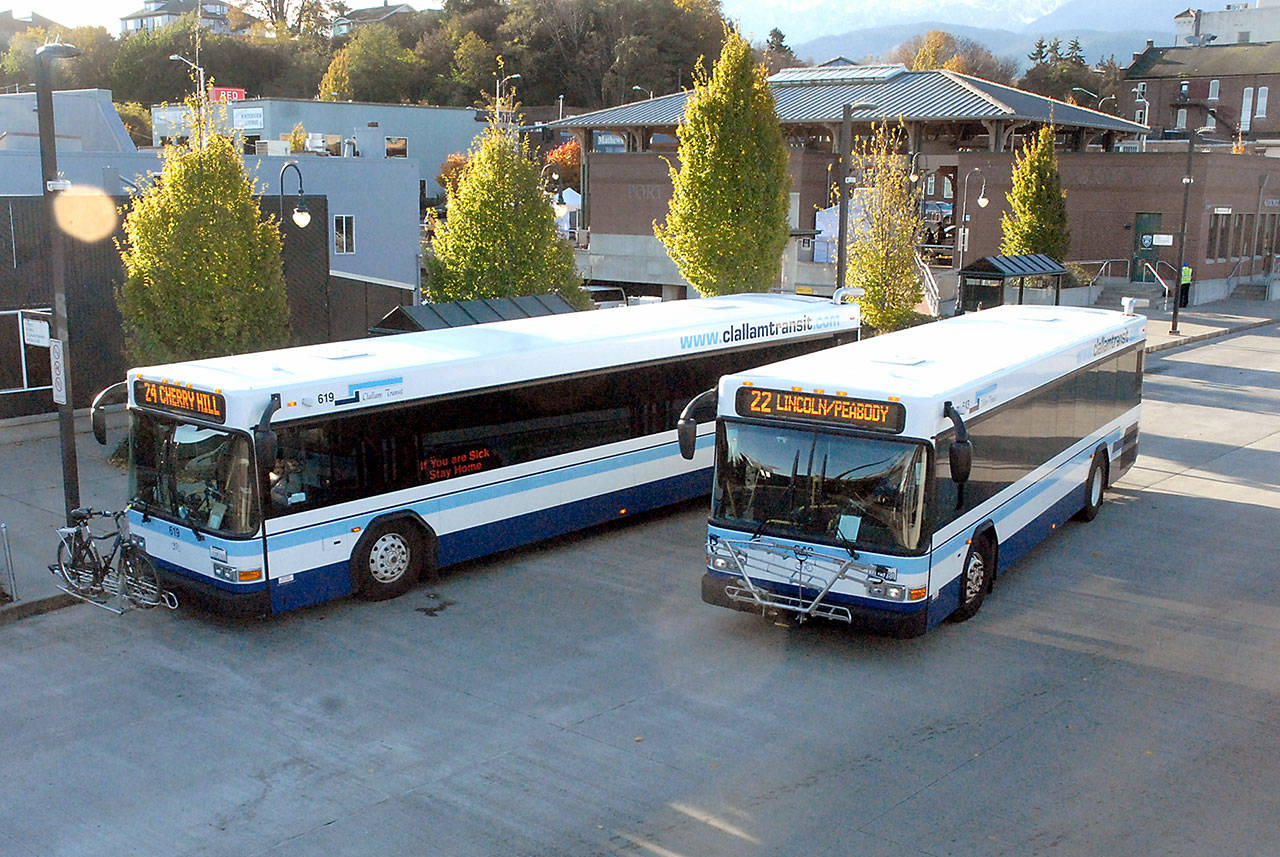PORT ANGELES — Clallam Transit will ride out the coronavirus pandemic with federal relief funds as ridership and sales tax collections continue to lag, a budget projection shows.
No service cuts or fare increases are being proposed for 2021, General Manager Kevin Gallacci said.
Clallam Transit received $4.4 million in Coronavirus Aid, Relief and Economic Security (CARES) Act funding this year and will use it to maintain current service levels into next year.
“I believe we’ve got a plan that looks pretty stable for 2021,” Gallacci said Thursday.
Gallacci briefed the Clallam Transit board on a draft budget in a strategy session Wednesday. Financial projections remain in flux given the uncertainties of COVID-19, Gallacci said.
“By the time we come to the board with a final budget for adoption, I can almost guarantee you it’s going to look slightly, if not significantly, different than this budget,” Gallacci told the board, which will approve a final budget in December.
“This is what we are working with today,” Gallacci said.
The draft budget as presented Wednesday shows $12.05 million in operating revenue, $11.32 million in operating expenses and an $8.72 million operating reserve heading into 2022.
Clallam Transit will use nearly half of that reserve — $4.1 million — to maintain operations through 2025, according to a five-year projection.
“There’s so many uncertainties in this because of the whole way that we do transit funding,” said Board President Lindsey Schromen-Wawrin, who is also a Port Angeles City County member.
“It’s hard to project reliably and sustainably out five years. And at the same time, we have to do that in order to do long-term planning.”
Clallam Transit relies on sales tax revenue and state and federal grants for the bulk of its operations.
Prior to the pandemic, ridership accounted for about 12 percent of the public agency’s operating revenue.
Ridership down
Clallam Transit had 31,853 fixed-route boardings last month, down 43 percent from September 2019, Operations Manager Jim Fetzer said in a memo.
The Strait Shot Route to Bainbridge Island had 417 boardings last month compared with 1,288 in September 2019.
System-wide ridership had been down 43 to 50 percent since the pandemic began in March, Gallacci said.
“Normally we want more ridership, but right now this level of ridership is assisting us in maintaining social distancing and restricting capacity levels on our buses,” Gallacci said in a telephone interview.
Riders are required to wear masks and maintain physical distancing when they board a Clallam Transit bus. Masks are provided to those who do not have a face covering.
Sales tax revenue was projected to be down about $90,000 this year because of COVID-19, Gallacci said. The hit to sales tax was not as significant as predicted early in the pandemic, he added.
CARES funding
Clallam Transit will use the CARES Act funding it received this year to maintain operations for the first half of 2021. Accumulated sales tax revenue will be used to cover the remainder of the year.
“My goal here is to keep service on the road, at least to the level we have it now, and continue to keep our employees working,” Gallacci said.
The draft budget assumes no fare hikes or sales tax growth for the next five years and a 0.1 percent interest rate. It contains 1 percent annual pay raises for employees in each of the next five years.
“I appreciate the conservative estimates for revenue,” Schromen-Wawrin said in the virtual meeting.
“I’m concerned that potentially the wage and benefits estimates are also conservative, which isn’t necessarily the way that I would go. But, of course, we’re going to figure that out as we go.”
In other Clallam Transit news, the board unanimously approved a $109,660 contract with Walker Consultants of Seattle to provide a “comprehensive transit operational analysis.”
The firm will review Clallam Transit routes, finances and available funding.
“These type of consultant activities are pretty common in transit,” Gallacci said.
“It just gives us an opportunity for someone looking with a different set of eyes at how we’re providing the service, along with the public and board input, and see if there’s anything we can do better to improve our services.”
________
Reporter Rob Ollikainen can be reached at rollikainen@peninsuladailynews.com.

